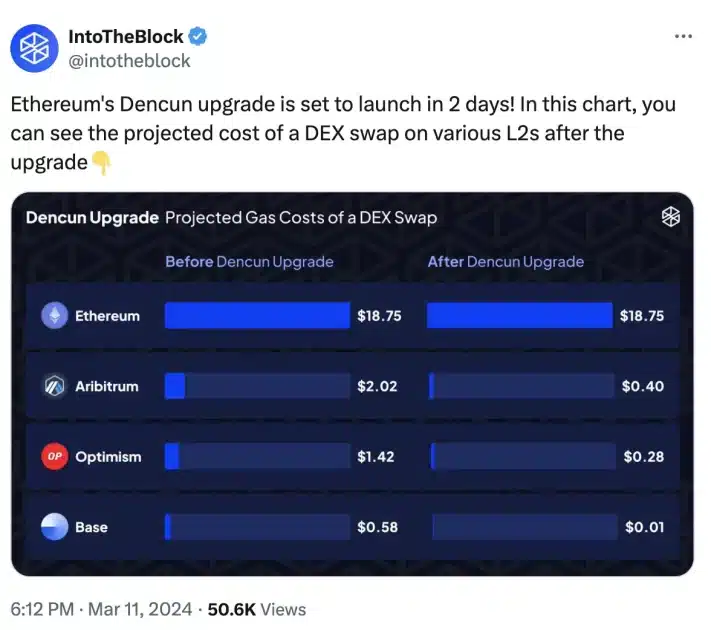The cryptocurrency market is constantly evolving. Every day, new integrations, updates, and other important events take place that bring the industry to a new level. Today, we are going to look at the most relevant crypto news that has happened recently.
Ethereum Dencun Update Launched
On March 13, the long-awaited Ethereum Dencun update was released, which attracted the attention of the crypto industry. The majority of the crypto community hopes that this update will be an important step for layer-2 networks, as it will significantly reduce transaction fees and increase Ethereum’s scalability.
A post by IntoTheBlock on X shows that except for Ethereum, the other three networks will experience a decrease in the cost of gas after the update is launched.
According to the forecasts, the projected price of Ethereum gas may remain unchanged at $18.75, which will provide stability for users and developers of the blockchain network. However, it is expected that the impact on other L2 platforms will be significant, as the projected price of gas on them will decrease significantly.

Source: IntoTheBlock/X
The Dencun hard fork contains 9 different suggestions for improving the blockchain. One of the most famous is the one that contributed to the launch of Uniswap v4, the long-awaited update to the popular decentralized exchange platform.
In addition, EIP-4844 guarantees a significant improvement in Ethereum’s scalability by introducing blockchain transactions specifically designed for the layer 2 (L2) networks that benefit from it. EIP-4788 focuses on strengthening the connection between Ethereum’s executive and consensus layers, which has the potential to improve network reliability and optimize the performance of staking pools.
The update is expected to not only increase the efficiency and scalability of the blockchain but also lead to an increase in the price of ETH and other tokens associated with L2 projects. This could trigger a new wave of investment in the Ethereum ecosystem, further strengthening its position as the foundation of decentralized finance.
London Stock Exchange Accepts Applications For Bitcoin ETNs
On Monday, the London Stock Exchange (LSE) announced that it will start accepting applications for Bitcoin and Ethereum exchange-traded notes (ETNs) in the second quarter of 2024. The exact launch date will be confirmed later.
The statement said that the exchange will accept applications following the newsletter.
“To mitigate the risk of delay in the admission timetable, the Exchange encourages early engagement from prospective issuers interested in admitting Crypto ETNs to trading on the Exchange,” the LSE added in the admission fact sheet.
In addition, the exchange noted that cryptocurrency ETNs will only be available to professional investors. They stated that the notes must be:
- Non-leveraged and backed by Bitcoin or Ethereum;
- The underlying crypto assets must be at least 90% held in cold wallets or something similar;
- Held by a custodian that is subject to anti-money laundering laws in the UK, EU, Switzerland, or the US.
Interestingly, this statement was made at a time when Bitcoin surpassed the $71,000 mark for the first time, rising by almost 70% this year amid massive investment in US exchange-traded funds.
WhiteBIT In Partnership With FC Barcelona Announced A New Educational Course
As part of its cooperation with FC Barcelona, WhiteBIT has announced the launch of a new educational program dedicated to blockchain technology and cryptocurrencies. The course is available on the Barça Innovation Hub platform, which is part of the football club’s ecosystem aimed at promoting modern technologies.
Apart from constantly introducing new training courses for their users, the company also frequently conducts various events and new listings. For example, they recently announced a new pair for trading perpetual futures $HOT-$PERP.
The goal of the course is to broaden the understanding of blockchain technologies and explore their practical application in life. The course explains in detail how sports and cryptocurrency intersect, as well as how it is being integrated into the industry.
The curriculum covers the following topics:
- Digital asset classification, a detailed overview of Bitcoin and Ethereum;
- Tools for working with cryptocurrencies, including exchanges and wallets;
- Fundamentals of crypto trading;
- Integration of blockchain technologies into various industries the example of the sports industry
Practical cases from WhiteBIT reinforce the theoretical content of the course. The first training session started on 10 March 2024. New applications will be accepted every month, and the recommended study time is 6 to 8 hours per week. Barça Innovation Hub and WhiteBIT are also working on a scholarship program for students, which they will announce soon.
Dubai Police Use Cardano Blockchain For Investigation
The Dubai Police Force has unveiled a project based on the Cardano blockchain to store and transfer criminal investigation data. The project demonstration demonstrated the secure exchange of forensic data with international security agencies, highlighting the technology’s effectiveness in secure data management.
According to GhostFund co-founder Chris Oh, the police’s choice to use Cardano highlights the potential of blockchain for secure and unbreakable data management.
He noted that “blockchain ensures that data will not be tampered with and can be tracked by various stakeholders.” For example, the technology could make it easier for international parties to securely share sensitive forensic data.
Omar Shands, a security expert, commented on the Dubai Police’s integration with Cardano, noting that blockchain is an extremely valuable tool that is becoming increasingly important in the security sector.
Solana’s Mempool In Jito Stops Operations
On Friday, the developer of the Solana client, Jito Labs, announced the decision to suspend mempool due to “negative externalities impacting users on Solana.”
A mempool is a place where transactions are stored between sending and receiving. The basic Solana framework does not have a mempool, but the Jito team implemented their own based on Jito’s Block Engine.
Thanks to this solution, traders on the network have the opportunity to configure bots so that they outperform other users’ trades and carry out “sandwich attacks”. A sandwich attack occurs when arbitrage bots trade against people whose transactions are in the mempool but have not yet been settled. Solana’s low commission made sandwiching too easy, and as a result, many users paid the price.
In a statement to CoinDesk, team representative Lucas Bruder said that Jito has been trying to minimize the negative impact of MEV for several months.
This included consulting with other protocols to detect trading bots and pricing mechanisms, but no suitable solution was found.
“Additionally, we attempted to engineer solutions to reject sandwich bundles, but our solutions became a cat-and-mouse game with MEV searchers,” the statement said. “Ultimately the Jito Labs team views negative MEV, including sandwich attacks, as a drag on the Solana ecosystem, and in the absence of an engineering solution we have made the difficult decision to suspend the mempool. We remain dedicated to providing an additional revenue stream for validators and stakers in addition to making Solana the best execution environment for all users.”
Free Tool: Use our simple crypto profit calculator to calculate your potential profits and returns on your cryptocurrency investments.<<<
